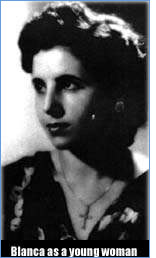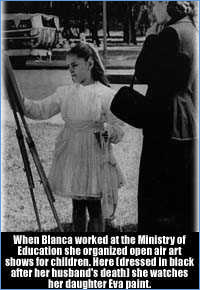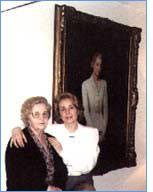
Newsletter
Editorial
"What it means to be an Argentine"
by Cristina Alvarez Rodriguez
Article
"Our True Life"
by Blanca Duarte de Alvarez Rodriguez
Editorial:
"What it means to be an Argentine"
by Cristina Alvarez RodriguezEvita still lives today. Near the end of the millennium she reaches us through this FIHEP newsletter.
Her presence touches the soul of each Argentine and goes beyond all political ideologies, beyond the love and hatred she experienced in her flesh.
This woman rises up from our pampas as a revindication, a war cry, the note that breaks through the crystal ceiling and powerlessness of so many women, men and children who find in her their hope. Mother of the dispossessed, venerated Saint Evita, owner of an exhaustive work load, of a schedule which did not include time to rest, bearer of the sorrows of her people and of the necessity to dignify women by giving them the power to vote, she went from dreams to reality, persevering and tenacious, a fighter, a hard wall to demolish. "No" was not part of her vocabulary (a vocabulary which some considered limited and crude but which was more than sufficient to communicate with those she loved). She kissed the lepers and said, ironically, "They [at least] will do me no harm.
In her autobiography, The Reason For My Life, she made a proposal: since practical people have governed for so long and we are in such bad shape, it would be good to give the idealists like her a chance to change history.
Her prediction to women was that "the twentieth century would not be remembered for the explosion of atomic energy but for the triumph of feminism.
She liked to be called Evita, Evita of Argentina, Revolution and Courage. Who knows to what plane of existence she belongs?
Myth or reality-- it is our challenge to reexamine, rethink and debate the identity of Evita. Evita was with us for thirty-three years: forty-six years have passed since her death and the disappearance and profanation of her body. After only seven years of intense labor during her husbandís administration, Evita can still mobilize people beyond our borders as well as recreate in us the identification with that heritage which should be part of our identity as Argentines.
"Our True Life"
by Blanca Duarte de Alvarez Rodriguez |
At the beginning of 1927, after our fatherís death, our mother worked incredibly long hours to support her "small tribe" (as she liked to call us, her five children). My sister Elisa helped by working at the Post Office.
After I finished primary school I wished to continue my studies but I couldnít do so in my hometown because Los Toldos had no secondary schools.
One of my motherís cousins, Prudencio Ibarguren, quickly became my ally and for a long time both he and I insisted that my mother let me leave my hometown to continue my studies. Finally, Mother agreed because she also wanted me to better myself in life.
It was hard for my mother to be separated from her children; she wanted to protect us and to keep us close to her because she loved us so much. But Prudencio and I insisted and insisted until Mother allowed me to go to Bragado and study at the Nacional School (a teacher training school).
Magdalena, Prudencioís mother, and her children Teresa, Pedro and Oscar welcomed me into their home as another daughter. My mother and siblings gave me lots of advice about the way I should behave and what I should do in Bragado. I was the first to leave home.
Thus, in 1927, as a member of the Ibarguren family under the watchful eyes of Magdalena and her children, I began my studies at the National School.
IíII never forget the first day of class, the words spoken by the Director, Rosa Reguera (replaced by Mrs. Blanca Maria Luisa de Oyer when the school was nationalized). Neither will I forget my classmates. I remember each oneís first and last name and even though I canít list them all, I would like to mention Cora Duhalde, Euidosia Ipacagueire, Angelita Fossati Ruiz, Felisa Llorente, Carmen Saldaño y Adela Puzzo. Many have already passed on, but those of us who are left continue to keep in touch, still united by our noble vocation as educators and by our exceptional training.
Mother and my siblings moved to Junín after Elisa was transferred to the Junín Post Office on August 2, 1930. Mother then insisted that I return home.
When I was in Bragado, either Mother or some of my siblings would visit me every fifteen days; I would return to Los Toldos whenever we had a holiday (because in those days we went to school even on Saturdays). Even though I was very happy during the years I spent at Bragado, I missed my family very much. I remember the last day of school and my farewell party very clearly as a day of joy and of sadness.
However, Mother had given the order that all her children should be reunited again.
I returned on August 2nd and completed my studies in Junín. As soon as I had graduated and based on my GPA, Msgr. Serafin offered me a teaching position in the Colegio de la Santa Unión de los Sagrados Corazones (Sacred Hearts School).
 When Blanca worked at the Ministry of Education she organized open air art shows for children. Here (dressed in black after her husband's death) she watches her daughter Eva paint. |
By this time, with the help of Elisaís job at the post office, Juanís job, and my teaching position, Mother was able to rest a little from her fatiguing work as a seamstress. Thus my family lived in Junín. The years went by and Juan was drafted into the Army. He was sent to Buenos Aires. During the afternoons in Junín, Prime Ariníís Music Store set up loud speakers on the street corner outside the shop. For the first time Evaís voice was broadcast over the airwaves. She recited a wide repertoire of poems with the same conviction and professionalism which would later help her to conquer the Capital as an actress. Even as a child, she had shown remarkable artistic talent. In the beginning we believed that her desire to be an actress was only a childhood dream. But her stubbornness in fighting for her dream led to lots of problems at home. Motherís opposition to Evaís dream was rooted in her desire to protect her child.
Eva wanted to travel to Buenos Aires to participate in an amateur talent show. No one could dissuade her. She showed the same iron will and determination which would mark her for the rest of her life. She insisted and insisted.
At first Motherís response was ABSOLUTELY NOT. Then Doctor José Alvarez Rodriguez, Rector of the National School of Junín, intervened. Dr. José Alvarez Rodriguez, an extraordinary human being and an excellent role model for young people, was the brother of my future husband, Justo.
Dr. Alvarez Rodriguezís advice was that parents have no right to thwart their childís vocation. "If the child has talent you must let her try her wings; if not, you will return home happy that you supported her.
I can still remember Motherís irritation and the climate of nervousness and sadness that prevailed in our house on the day our mother accompanied Eva to Buenos Aires. Eva, however, was confident and serene.
That evening Elisa, Erminda and I listened to the radio program which paid homage to the city of Bolivar. Were we ever surprised to hear Evaís voice! She was reciting the poem by Amado Nerve, "Where Do the Dead Go?" Everything went so well that Pablo Osvaldo Valle, director of the station, called her and Mother into his office and offered Eva a small contract; this contract made it necessary for her to stay in Buenos Aires.
Mother returned alone to Junín, furious with Rector and with all of us.
From then on, Eva only returned to Junín for someoneís birthday or if one of us was ill. She worked tirelessly to conquer the Capital and shared those early days in Buenos Aires with our brother, Juan. Later, in 1936, my sister Elisa married Major Alfredo Arrieta and they went to live in Buenos Aires. At last Eva would have more family with her and Mother would be more tranquil and content.
Much has been written about my sister Eva and about us, "The Duartes," without bearing in mind that only a small group of relatives and friends, and we, her family, know her true story since it belongs to us and to our intimate circle.
Even when Eva was working most intensely, our family used to enjoy sharing these lovely memories with her during her few moments of free time. We lost those moments when, after seven marvelous years of love, Our Lord called her to Himself, but we retained the memories and kept the difficult promise Eva insisted her mother and her siblings make to her: the promise not to respond to attacks.

One of the greatest joys of my 87 years is that the oldest of my granddaughters, Cris, free of all promises, wants everyone to know about our beautiful and true life.
I say beautiful not because our life was easy but because of the love and indestructible bonds which united Juan Duarte and Juana Ibarguren with us, their children, Elisa, Blanca (me), Juan, Erminda and Eva.
I have so many interesting memories, so much to tell; I would like to share with you these years of my life.
Except where otherwise noted, all contents copyright 1998, FIHEP. All rights reserved.

